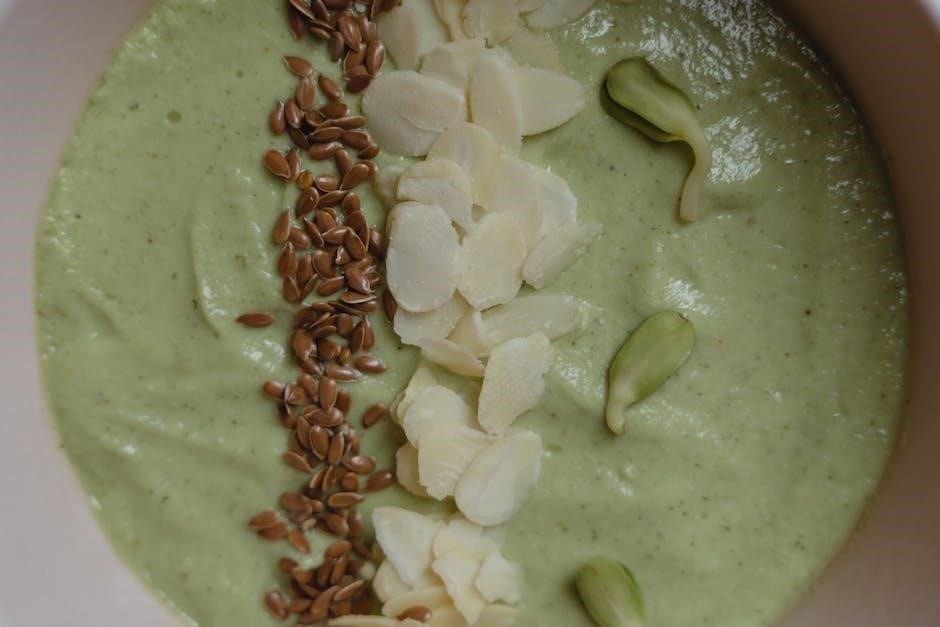
A cortisol detox diet focuses on whole, nutrient-rich foods to support hormonal balance and reduce chronic stress. It’s not a crash diet but a lifestyle shift promoting balanced cortisol levels through food, sleep, and stress reduction, leading to improved energy and well-being.

The Cortisol Detox Diet Plan
Focus on whole foods, healthy fats, lean proteins, and antioxidants. This structured plan emphasizes nutrient-rich meals to support adrenal function and naturally lower cortisol, promoting a balanced lifestyle without extreme restrictions or calorie deprivation.
2.1 Foods to Focus On
Emphasize whole, nutrient-dense foods to support adrenal health and reduce cortisol. Include magnesium-rich options like spinach, almonds, and pumpkin seeds, as magnesium helps calm the body. Omega-3 fatty acids found in fatty fish, such as salmon, reduce inflammation and support brain health. Leafy greens and cruciferous vegetables like kale and broccoli aid in detoxification and balance hormones. Healthy fats from avocados, walnuts, and olive oil promote hormone signaling and satiety. Berries, such as blueberries, provide antioxidants to combat oxidative stress. Whole grains like quinoa and brown rice offer sustained energy and fiber, stabilizing blood sugar. Protein sources like lean meats, eggs, and legumes support energy and hormone production. Avoid processed foods, sugary snacks, and excessive caffeine, as they can spike cortisol levels. Incorporating these foods creates a balanced diet that supports adrenal function and overall well-being, helping to naturally lower cortisol levels and reduce stress.

2.2 Sample 7-Day Meal Plan
A structured 7-day meal plan helps manage cortisol levels through nutrient-rich, balanced meals. Start your day with a cortisol-friendly breakfast like Greek yogurt with blueberries and almonds, or avocado toast with a poached egg. For lunch, opt for grilled chicken salad with spinach, arugula, and olive oil dressing, or a quinoa bowl with roasted vegetables; Dinners could include baked salmon with asparagus, sweet potatoes, and a side of steamed broccoli, or turkey lettuce wraps with avocado slices. Snacks like mixed nuts, hard-boiled eggs, or a handful of berries provide energy boosts without spiking cortisol. Incorporate omega-3 rich fatty fish, leafy greens, and whole grains throughout the week. Avoid sugary and processed foods, and limit caffeine intake. This meal plan focuses on whole foods, healthy fats, and antioxidants to support adrenal health and naturally lower cortisol levels, promoting a balanced and energized lifestyle.

2.3 Recipes for Cortisol Reduction
Specific recipes can help reduce cortisol by incorporating stress-reducing ingredients. One such recipe is an
Avocado and Spinach Omelet
, made with eggs, spinach, avocado, and a sprinkle of chili flakes. Spinach provides magnesium, which calms the nervous system, while avocado offers healthy fats to stabilize hormones. Another option is
Baked Salmon with Quinoa and Broccoli
, featuring salmon rich in omega-3s to combat inflammation and quinoa for sustained energy. For a snack, try a
Berry and Almond Bowl
with mixed berries, almonds, and a drizzle of honey. Berries are packed with antioxidants to reduce oxidative stress, and almonds provide magnesium to lower cortisol. These recipes focus on whole, nutrient-dense foods to support adrenal health and promote balanced cortisol levels, helping you feel more relaxed and energized throughout the day.
Lifestyle Modifications for Cortisol Management
Combining regular physical activity, adequate sleep, and stress-reduction practices supports cortisol balance. These modifications complement dietary changes, creating a holistic approach to manage stress hormones and promote overall well-being effectively.
3.1 Exercise and Movement
Regular physical activity is crucial for managing cortisol levels. Activities like yoga, brisk walking, and swimming can help reduce stress and lower cortisol. Strength training and high-intensity interval training (HIIT) also support hormonal balance. Overtraining should be avoided, as it may increase cortisol. Consistency is key; aim for at least 30 minutes of moderate exercise most days of the week. Movement helps improve mood, energy levels, and overall well-being, complementing the effects of a cortisol detox diet. Tailor your workouts to your fitness level and preferences to maintain long-term adherence. Even simple daily routines, like stretching or short walks, can make a difference. Incorporating physical activity into your lifestyle not only aids in cortisol regulation but also enhances the benefits of dietary changes, promoting a healthier, more balanced you.
3.2 Sleep Optimization

Sleep plays a vital role in cortisol regulation and overall hormonal balance. Aim for 7-9 hours of high-quality sleep per night to support adrenal function and stress reduction. Establish a consistent sleep schedule, avoiding screens and stimulating activities before bedtime. Create a relaxing bedtime routine, such as reading or meditating, to signal your body it’s time to wind down. A dark, cool, and quiet sleep environment can enhance sleep quality. Avoid caffeine and heavy meals close to bedtime, as they can disrupt sleep patterns. Poor sleep can elevate cortisol levels, making it harder to manage stress and maintain energy. Prioritizing sleep optimization complements the cortisol detox diet and lifestyle changes, promoting better hormonal balance and overall well-being. By making sleep a priority, you can help regulate cortisol levels and support your body’s natural recovery processes.
3.3 Stress-Reduction Techniques
Chronic stress is a significant contributor to elevated cortisol levels, making stress reduction essential for hormonal balance. Incorporating mindfulness practices such as meditation, deep breathing exercises, and yoga can help lower cortisol naturally. These techniques promote relaxation and reduce the body’s stress response. Spending time in nature, whether through walking or simply sitting outdoors, also has a calming effect on the mind and body. Additionally, engaging in hobbies or creative activities can distract from stressors and provide emotional relief. Time management and setting realistic goals can prevent overwhelm, further supporting cortisol regulation. Combining these stress-reduction techniques with a balanced diet and adequate sleep creates a holistic approach to managing cortisol levels. By prioritizing relaxation and mental well-being, individuals can better support their body’s natural ability to regulate stress hormones and maintain overall health.

Common Misconceptions About Cortisol Detox

One common misconception about cortisol detox is that it involves extreme fasting or restrictive dieting. While a cortisol detox diet emphasizes whole, nutrient-rich foods, it is not about starvation or deprivation. Another myth is that detox plans are a quick fix for weight loss or stress reduction. In reality, cortisol detox is a long-term lifestyle approach aimed at balancing hormones and improving overall health. Some believe that supplements alone can lower cortisol, but a holistic strategy combining diet, exercise, and stress management is necessary. Additionally, many think that all detox plans are the same, but a cortisol-focused detox is tailored to address stress hormones specifically. It’s important to separate fact from fad and understand that a cortisol detox is not a magic solution but a structured plan to support the body’s natural processes. Misinformation can lead to ineffective or harmful practices, so it’s crucial to rely on evidence-based strategies.
Adopting a cortisol detox diet plan is a proactive approach to managing stress and promoting overall well-being. By focusing on nutrient-dense foods, healthy lifestyle habits, and stress reduction techniques, individuals can support their body’s natural ability to regulate cortisol. This structured plan not only helps in reducing stress hormones but also enhances energy levels, improves sleep quality, and supports weight management. It’s important to view the cortisol detox as a sustainable lifestyle change rather than a short-term solution. With the right balance of diet, exercise, and mindfulness practices, you can create a foundation for long-term health and resilience. Remember, consistency and patience are key to seeing meaningful results. By incorporating these strategies, you can take control of your cortisol levels and move toward a healthier, more balanced life.